情态动词中考重难点及易错点
2023年初中英语语法之常考情态动词归纳汇总及易错分析

2023年初中英语语法之常考情态动词归纳汇总及易错分析一、can和could1、can的用法(1)表示体力和脑力方面的能力。
(2)表示对现在的动作或状态进行主观的猜测,主要用在否定句和疑问句中(3)表示可能性,理论上的可能性,意为“有时候可能会”,可用于肯定句(4)表示允许,意思与may接近(5)表示说话人的推测、怀疑、惊异、猜测或不肯定等,主要用于否定句、疑问句或感叹句中。
(6)can的特殊句型cannot...too / enough表示“无论怎么、也不过分”。
“越、越好”cannot but+ do sth.表示“不得不,只好”2、could的用法( 1)表示能力,指的是过去时间。
( 2)表示允许,指的是过去时间。
(3)表示可能,可以指过去时间,也可以指现在时间,表示语气缓和(4)委婉客气地提出问题或陈述看法,指的是现在时间。
主要用于疑问句,回答时用can。
3、can与could的区别can表推测时只用于否定句和疑问句( could无此限制)。
couldn’t的可能性比can’t小小。
4、can与be able to的区别(1)现在时 : 无区别,但后者不常用(2)完成时;can没有完成时,此时要用have( has,had ) been able to。
( 3)将来时: can没有将来时,要用will be able to。
(4)过去时:could表示一般能力,was/were able to 表示在具体场合通过努力成功做成某事的能力。
、may 和might1、may的用法(1)表示询问或说明一件事可不可以做(2)表示一件事或许会发生或某种情况可能会存在,通常用在肯定句和否定句中注意:表示可能性时,can’t语气强,表示“不可能”,may not 语气弱,表示“可能不"2、might的用法(1)表示询问或允许,指的是过去时间。
(2)表示可能发生的事,可以指过去时间,也可以指现在时间,语气更加不肯定,可能性比may小一些。
2023中考英语重难点专练 专题09 情态动词(原卷版)

2023中考英语重难点专练专题09 情态动词1.can/could用法考点1.1.表示能力,意为“能,会”。
could是can的过去式,表示过去的能力。
辨析:can和be able to的区别1.2.表示推测,意为“可能”,常用于否定句和疑问句中。
could既可以表示过去的可能性,又可以表示现在的可能性,其语气更弱一些。
例句This can't be the right road.不可能是这条路。
1.3.表示请求或允许,常用于“Can/Could l/you...?”句型中。
could不表示过去,而是表示委婉的请求,但答语只能用can.例-Could you help me work out the problem?你能帮我做出这道题吗?-Yes,I can.是的,可以。
2.may/might用法考点2.1.may/might表示把握性不大的推测,意为“或许,可能”,可以对现在、过去或将来的情况进行推测,常用于肯定句中。
might表示的可能性低于may.例I might be a few minutes late.我可能会晚到几分钟。
2.2.may/might表示请求许可或征求对方的意见。
给予许可时可用may,但不能用might.例-May/Might I come in?我可以进来吗?-Yes,you may.是的,你可以。
不能用might3.must的用法考点3.1.must 表示义务,意为“必须”,强调说话人的主观意志。
例You must work hard.你必须努力工作。
辨析:must和have to的区别You have to wear sports shoes when you climb a mountain.爬山的时候你必须穿运动鞋。
3.2.must表示推测时,指有根据、有把握的推测,只能用于肯定句。
可以对现在、过去或将来的情况进行推测。
例You must be a middle school student.你一定是一名中学生。
透析中考英语语法情态动词考点
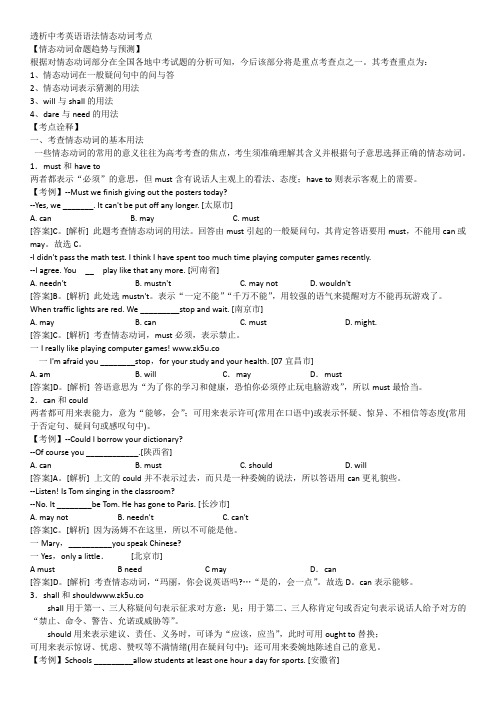
透析中考英语语法情态动词考点【情态动词命题趋势与预测】根据对情态动词部分在全国各地中考试题的分析可知,今后该部分将是重点考查点之一。
其考查重点为:1、情态动词在一般疑问句中的问与答2、情态动词表示猜测的用法3、will与shall的用法4、dare与need的用法【考点诠释】一、考查情态动词的基本用法一些情态动词的常用的意义往往为高考考查的焦点,考生须准确理解其含义并根据句子意思选择正确的情态动词。
1.must和have to两者都表示“必须”的意思,但must含有说话人主观上的看法、态度;have to则表示客观上的需要。
【考例】--Must we finish giving out the posters today?--Yes, we _______. It can't be put off any longer. [太原市]A. canB. mayC. must[答案]C。
[解析] 此题考查情态动词的用法。
回答由must引起的一般疑问句,其肯定答语要用must,不能用can或may。
故选C。
-I didn't pass the math test. I think I have spent too much time playing computer games recently.--I agree. You __ play like that any more. [河南省]A. needn'tB. mustn'tC. may notD. wouldn't[答案]B。
[解析] 此处选mustn't。
表示“一定不能”“千万不能”,用较强的语气来提醒对方不能再玩游戏了。
When traffic lights are red. We _________stop and wait. [南京市]A. mayB. canC. mustD. might.[答案]C。
情态动词考点易错点的总结

情态动词考点易错点的总结一、单项选择情态动词1.I’m sorry, but you _____ go wrong. There’s no such man here.A.need B.can C.must D.will【答案】C【解析】【详解】考查情态动词。
句意:很抱歉,但是你一定是弄错了。
这儿没有这么个人。
A. need需要;B. can能够;C. must必须;D. will将会。
must指有把握的推测,“一定;必定”,结合下文There’s no such man here.可知一定是弄错了。
故选C。
2.-- Did Jim come?-- I don’t know. He _______ while I was out.A.might have come B.might comeC.must have come D.should have come【答案】A【解析】【详解】考查情态动词推测用法。
句意:Jim来了吗?--我不知道,在我不在的时候,可能来过。
根据前文I don’t know.可知,说话者不知道Jim来没来,因此后文推测来过,但是语气很不确定,故可知选A。
对过去情况的推测为情态动词+have done,must have done 一定做了某事,should have done 应该来过,不符合,故选A。
【点睛】情态动词+have+过去分词的用法,表示推测或判断过去的情况。
can/could+have+过去分词用法:①多用于否定句和疑问句中。
表示对过去某事发生的可能性的否定或质疑,意为:不可能(已经)......了-(否定句)/可能(已经)......了嘛?-(疑问句)②用于肯定句中。
表示对过去没有做某事的遗憾,含有轻微的责备,意为:本来可以......的(但实际上没有......)。
You could have done better, but you were too careless.(肯定句。
中考英语情态动词考点总结与归纳
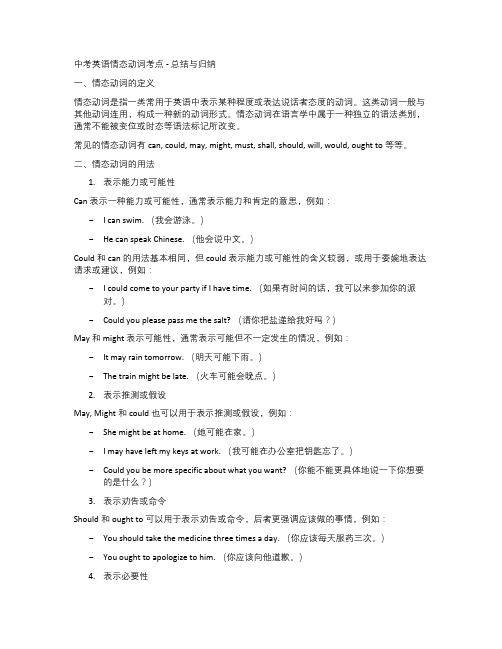
中考英语情态动词考点 - 总结与归纳一、情态动词的定义情态动词是指一类常用于英语中表示某种程度或表达说话者态度的动词。
这类动词一般与其他动词连用,构成一种新的动词形式。
情态动词在语言学中属于一种独立的语法类别,通常不能被变位或时态等语法标记所改变。
常见的情态动词有 can, could, may, might, must, shall, should, will, would, ought to 等等。
二、情态动词的用法1.表示能力或可能性Can 表示一种能力或可能性,通常表示能力和肯定的意思,例如:-I can swim. (我会游泳。
)-He can speak Chinese. (他会说中文。
)Could 和 can 的用法基本相同,但 could 表示能力或可能性的含义较弱,或用于委婉地表达请求或建议,例如:-I could come to your party if I have time. (如果有时间的话,我可以来参加你的派对。
)-Could you please pass me the salt? (请你把盐递给我好吗?)May 和 might 表示可能性,通常表示可能但不一定发生的情况,例如:-It may rain tomorrow. (明天可能下雨。
)-The train might be late. (火车可能会晚点。
)2.表示推测或假设May, Might 和 could 也可以用于表示推测或假设,例如:-She might be at home. (她可能在家。
)-I may have left my keys at work. (我可能在办公室把钥匙忘了。
)-Could you be more specific about what you want? (你能不能更具体地说一下你想要的是什么?)3.表示劝告或命令Should 和 ought to 可以用于表示劝告或命令,后者更强调应该做的事情,例如:-You should take the medicine three times a day. (你应该每天服药三次。
【英语】情态动词考点易错点的总结
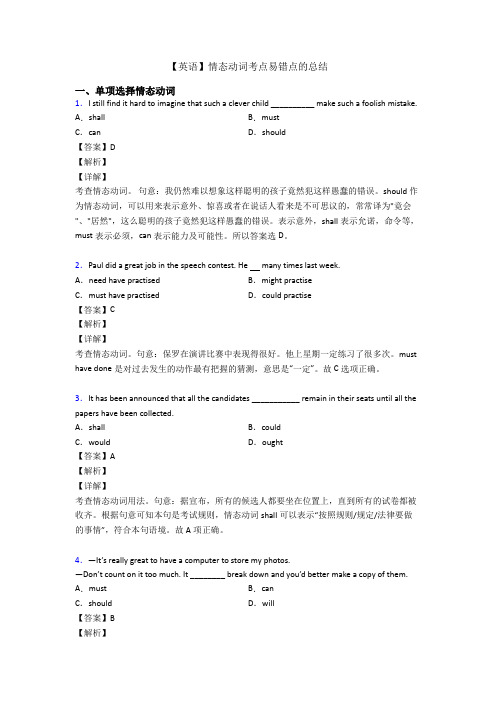
【英语】情态动词考点易错点的总结一、单项选择情态动词1.I still find it hard to imagine that such a clever child __________ make such a foolish mistake. A.shall B.mustC.can D.should【答案】D【解析】【详解】考查情态动词。
句意:我仍然难以想象这样聪明的孩子竟然犯这样愚蠢的错误。
should 作为情态动词,可以用来表示意外、惊喜或者在说话人看来是不可思议的,常常译为"竟会"、"居然",这么聪明的孩子竟然犯这样愚蠢的错误。
表示意外,shall表示允诺,命令等,must表示必须,can表示能力及可能性。
所以答案选D。
2.Paul did a great job in the speech contest. He many times last week.A.need have practised B.might practiseC.must have practised D.could practise【答案】C【解析】【详解】考查情态动词。
句意:保罗在演讲比赛中表现得很好。
他上星期一定练习了很多次。
must have done是对过去发生的动作最有把握的猜测,意思是“一定”。
故C选项正确。
3.It has been announced that all the candidates ___________ remain in their seats until all the papers have been collected.A.shall B.couldC.would D.ought【答案】A【解析】【详解】考查情态动词用法。
句意:据宣布,所有的候选人都要坐在位置上,直到所有的试卷都被收齐。
根据句意可知本句是考试规则,情态动词shall可以表示“按照规则/规定/法律要做的事情”,符合本句语境。
情态动词重难点

情态动词重难点情态动词有具体的词义,但也同助动词一样,需要与动词原形一起构成句子的谓语,另外情态动词没有人称和数的变化,情态动词后必须跟动词原形。
一. 10个最重要情态动词的用法1. can⑴表示能力,一般译为“能、会”,尤其指生来具备的能力。
She can swim fast, but I can’t .她会游泳,但我不会。
⑵表示许可,常在口语中。
You can use my dictionary.你可以使用我的词典。
⑶表示推测,意为“可能”,常用于否定句和疑问句中,此时can’t译为“不可能”。
Can the news be true?这个消息可能是真的吗?It can’t be our teacher. He is on a visit to the Great Wall.不可能是我们老师。
他正在参观长城呢。
2. could⑴ can的过去式,意为“能、会”,表示过去的能力。
He could write poems when he was 10.他十岁的时候就会写诗。
⑵ could在疑问句中,表示委婉请求的语气,此时could没有过去式的意思。
Could you do me a favour?你可以帮我一个忙吗?—Could I use your pen? 我可以使用你的钢笔吗?—Yes, you can.(注意回答)可以。
3. may⑴表示请求、许可,比can正式,May I borrow your bike?我可以借用你的自行车吗?You may go home now.你现在可以回家了。
⑵表示推测,谈论可能性,意为“可能,或许”,一般用于肯定句中。
It may rain tomorrow .明天可能会下雨。
⑶ may的过去式为might。
might 也可以表示可能性低于may(此时might没有过去式的意思)。
He is away from school. He might be sick.他离开学校了。
情态动词的知识重点与难点总结
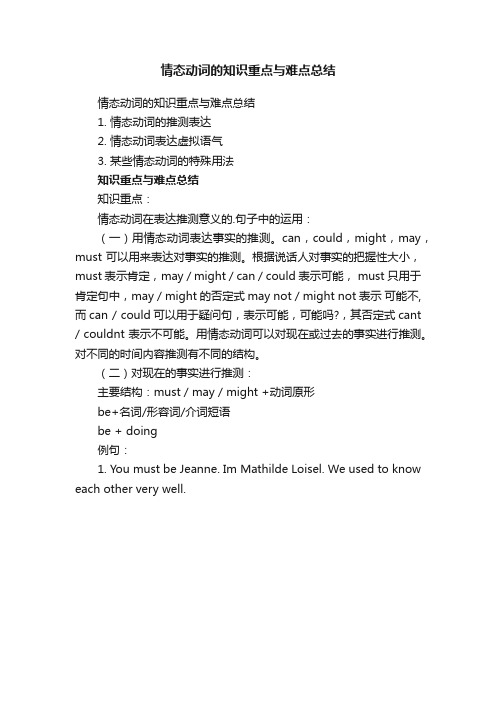
情态动词的知识重点与难点总结
情态动词的知识重点与难点总结
1. 情态动词的推测表达
2. 情态动词表达虚拟语气
3. 某些情态动词的特殊用法
知识重点与难点总结
知识重点:
情态动词在表达推测意义的.句子中的运用:
(一)用情态动词表达事实的推测。
can,could,might,may,must可以用来表达对事实的推测。
根据说话人对事实的把握性大小,must表示肯定,may / might / can / could表示可能, must只用于肯定句中,may / might的否定式may not / might not表示可能不, 而can / could可以用于疑问句,表示可能,可能吗?,其否定式cant / couldnt 表示不可能。
用情态动词可以对现在或过去的事实进行推测。
对不同的时间内容推测有不同的结构。
(二)对现在的事实进行推测:
主要结构:must / may / might +动词原形
be+名词/形容词/介词短语
be + doing
例句:
1. You must be Jeanne. Im Mathilde Loisel. We used to know each other very well.。
(完整版)情态动词中考重难点及易错点

Part 4 【语法】の情态动词重难点及易错点情态动词+动词原形情态动词表允许及其回答情态动词表猜测【情态动词表允许】1、请求允许做某事时,can最常用,在没有把握或为表现得更客气一些时,可用could;而may比can 更正式一些,且多用于第一人称Could I watch TV?Can you find a seat for me?May I use your phone?2、当允许某人做某事时,要用can和may,不用could 和might.Could I borrow your computer? Yes, of course you can.Might I trouble you for a light? Yes, you may.3、常考易错点:对情态动词表请求的回答:肯定:Sure. 否定:You’d better not.Certainly. I’m afraid not.Yes, do please. I’m sorry, but you can’t/mustn’t.No problem.That’s OK/all right.Yes, you can/may.With pleasure.4、例:May I smoke here? Sorry, but you mustn’tMust I go home before 8 o’clock?No, you needn’t/don’t have to .Need I go? Yes, you must. / No, you needn’t.Would you mind.... if I smoke here? Yes, you’d better no t. / No, of course not.【情态动词表猜测】肯定:must >can>may否定:can’t > may not一定是;肯定是________; 可能是________;一定不是;不可能是________; 可能不是________;【针对练习】( ) 1. "________ I take it out?" "I'm sorry, you ________."A. Could ...couldn'tB. Might...might notC. Could ...canD. May...can't ( ) 2. "Need we do this job now?" "Yes, ________."A. you needB. you shouldC. you mustD. you can( ) 3. He said that you ________ watch TV all the evening if you wished.A. mayB. mustC. canD. might( ) 4. Peter ________ come with us tonight, but he isn't very sure yet.A. mustB. canC. mayD. will( ) 5. Michael ________ be a policeman, for he's much too short.A. needn'tB. can'tC. shouldn'tD. won't( ) 6. Come on! We ________ hurry because there isn't much time left.A. mayB. mustC. canD. need( ) 7. ---Do you mind if I turn on the TV?---________. My father is sleeping.A. Better not.B. No, not at all.C. No, I don’t mind.D. That’s all right. ( ) 8. ---Would you mind my sitting next to you?---________.A. No, of course not.B. No, you can’t.C. Yes, please.D. Yes, go ahead. ( ) 9. ---Would you please pass me today’s paper?---________.A. Yes, please.B. Here you are.C. You are welcome.D. I think so. ( ) 10. ---"Could I call you by your first name?"---"Yes, you________."A. willB. couldC. mayD. might( ) 11. I wasn't sure whether I ________offer to help or not.A. shouldB. mightC. wouldD. needed ( ) 11. There ________ too much noise in a hospital.A. should haveB. shouldn't haveC. ought to beD. oughtn't to be( ) 12. Albert is too fat. She ________ eat too much sweet.A. had better notB. shouldC. ought toD. ought to not ( ) 13. --- ________ they better wait here, sir?---No, they ________.A. Do; don'tB. Had; hadn'tC. Had; don'tD. Had; had ( ) 14.--Excuse me, sir! Can I finish my homework tomorrow morning?--- Oh, no. It ________ be finished tonight,A. wouldB. shouldC. couldD. can( ) 15.You had better________ your job on timeA. finishingB.to finishC. finishD. finished BABBC【巩固练习】( ) 12. -Is John coming by train?--He should, but he ________ not. He likes driving his car.A. mustB. canC. needD. may( ) 13. I thought you ________ be hungry, so I have brought you some cakes.A. mayB. mightC. canD. could( ) 14. ---Could you please help me choose an MP4 player online?---________. My computer doesn’t work.A. I don’t care.B. I hope so.C. I’m afraid not.( ) 15. ---Would you mind if I sit here?---________. It’s for Miss Zhang.A. Better not.B. Never mind.C. Not at all.D. Of course not.( ) 16. You ________walk for miles and miles among the hills without meeting anyone if you go there.A. mustB. needC. mayD. should DCDDC BBBAC AABCCA【中考链接】( ) 1. To keep children safe, we ___________ put the things like knives and medicine away in our house. (2017广东中考)A. mayB. shouldC. canD. might( ) 2. ---Mum, ____ I visit the Modern Art Museum next Monday? (2016广东中考) ---I’m afraid you can’t. All the museums in this city are closed on Monday.A. wouldB. needC. shouldD. may( ) 3. --- ________ I hand in the report today? (2017北京中考)--- No, you needn’t.A. CanB. MustC. ShallD. Could( ) 4. ---________ I park my car here for a while? (2017上海中考)---No, you mustn’t. Do you see the sign“NO PARKING”?A. WouldB. MayC. MustD. Should( ) 5. ---Must I prepare for the trip today? (2017哈尔滨中考)--- No, you _________ prepare for it today. You can do it tomorrow.A. needB. don’t needC. needn't( ) 6. ---Many people play with mobile phones all day instead of reading books.---That’s too bad. Everyone ________ be a book lover. Reading is more enjoyable. (2016山西中考)A. mayB. shouldC. would( ) 7. ---Mum, ________I play football this afternoon? (2016天津中考) ---Sure, but you ________ finish your homework first.A. may; couldB. can; mustC. can; mustn’tD. may; can’t。
人教版七年级下册英语之情态动词的常见错误
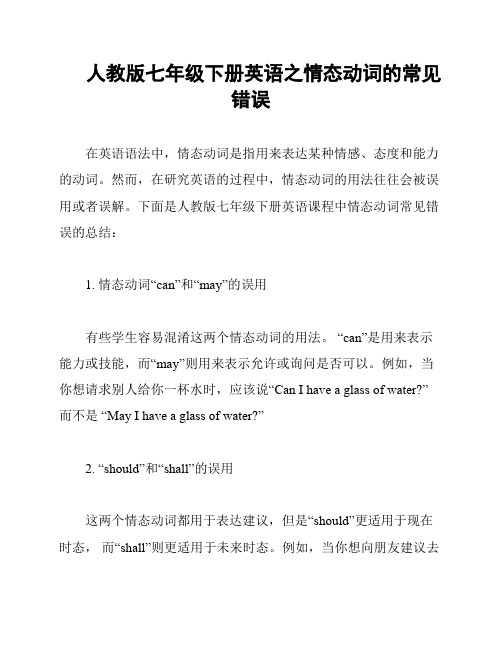
人教版七年级下册英语之情态动词的常见
错误
在英语语法中,情态动词是指用来表达某种情感、态度和能力的动词。
然而,在研究英语的过程中,情态动词的用法往往会被误用或者误解。
下面是人教版七年级下册英语课程中情态动词常见错误的总结:
1. 情态动词“can”和“may”的误用
有些学生容易混淆这两个情态动词的用法。
“can”是用来表示能力或技能,而“may”则用来表示允许或询问是否可以。
例如,当你想请求别人给你一杯水时,应该说“Can I have a glass of water?” 而不是“May I have a glass of water?”
2. “should”和“shall”的误用
这两个情态动词都用于表达建议,但是“should”更适用于现在时态,而“shall”则更适用于未来时态。
例如,当你想向朋友建议去
看一场电影时,应该说“we should go to see a movie”而不是“we shall go to see a movie”
3.动词用法问题
有些情态动词有一些固定的动词短语。
例如,“had better”和“would rather” 通常会后接以“not”开头的动词。
例如,我们应该说“had better not go ”而不是“had better don't go”
以上是人教版七年级下册英语课程中情态动词常见的误用,希望同学们可以注意这些错误,提高自己的英语语法水平。
情态动词重难点小结

情态动词重难点小结一、 need的用法1. need作情态动词,一般用于疑问句和否定句中,表示“需要”、“必要”。
当其用于现在时和将来时时,在宾语从句中可当过去时用。
肯定回答用must(或have to, ought to, should) 来表达。
否定式为need not / needn't表示“不必,不需要”。
如:(1) You needn't show your passport at the entrance unless the guard asks you for it.(2) —shall I tell Jack about it?—No, you needn't. I've told him already.2. need作实义动词,意为“需要”、“要求”。
如:(1) You don't need to leave so early.(2) He needs to try one more experiment.二、 dare 的用法1. 情态动词,表示“敢”,后接动词原形,用于否定句、疑问句和条件状语从句中。
如:(1) We dare not refuse their request.(2) Dare you walk through the forest at night?2. 当实义动词用时,可用于各种句型中。
dare作实义动词用在否定句和疑问句中时,其后接不定式有时可省去“to”。
如:(1) Does he dare to come?(2) She dares to speak in front of big audience.(3) I have never dared (to) speak to him.三、 can、be able to 和could的用法1. can和be able to都表示“能力”。
但can只有现在时和过去时,而be able to则有更多的形式。
人教版英语英语情态动词难点、易错点含答案解析

人教版英语英语情态动词难点、易错点含答案解析一、初中英语情态动词1.—Mum, I play football this afternoon?—Sure, but you finish your homework first.A. may; couldB. can; mustC. can; mustn'tD. may; can't【答案】 B【解析】【分析】句意:-妈妈,今天下午我能踢足球吗?-当然,但是你必须先完成作业。
前句提请求,can,may都可以;后句,由sure可知后句用肯定回答。
Could表示一种委婉的语气;must表示主观愿望:必须。
妈妈要求孩子“必须”先完成作业。
故选B。
【点评】考查情态动词辨析,may表示请求时候的回答用语。
2.—How amazing this robot is!—Wow, it has video cameras in its eyes, so it “see” and interact with people.A. mayB. canC. mustD. should【答案】 B【解析】【分析】句意:—这个机器人多么惊人啊!—哇,在它的眼睛里有摄像机,因此它能看见和人打交道。
A. may 可以,可能;表示许可,B. can 能;表示能力,C. must 必须;D. should应该;根据it has video cameras in its eyes,可知是有能力看见,故选B。
【点评】考查情态动词辨析。
熟记情态动词的含义和用法。
3.—Shall we meet at the station at 9 a.m.?—In fact we ______. The train ______until 11a.m.A. needn't; will leaveB. needn't; won't leaveC. mustn't; leavesD. mustn't; doesn't leave【答案】 B【解析】【分析】句意:—我们上午9点在车站见面好吗?—事实上我们不需要。
中考英语 常考易错点 专题十一 情态动词

情态动词易错清单1. can与be able tocan和be able to表示能力时用法相同,但can只有原形和过去式(could)两种形式,在其他时态中要用be able to 来表示。
另外 be able to 常常指经过努力,花费了时间和劳力之后才能做到某事。
如:Jim can't speak English. 吉姆不会说英语。
He could speak English at 5. 他五岁时就会说英语。
We'll be able to see him next week. 下星期我们将会见到他。
2. can与may(1)can 和 may 均可用来征求意见或许可,意为“可以”, 一般可互换使用。
如:Can/ May I help you?我能帮助你吗?(2)can和may 表示可能性时的区别:1)在肯定句中用 might,may,must,不用can;2)在疑问句中表示推测用can,不用 might,may,must;3)在否定句中用can't(不可能),不用 may,must。
如:She may be in the classroom.她可能在教室里。
Where can they be now?他们现在可能在哪儿?That can't be true. 那不可能是真的。
3. may be与maybemay be中的may为情态动词, be为动词原形,在句中作谓语。
而maybe是副词,意思是“大概、也许”,相当于perhaps,常放在句首,作状语。
如:He may be wrong,but I'm not sure.也许他错了,但我也不确定。
Maybe she'll come this afternoon.她可能今天下午来。
4. can't 与 mustn't(1)can't 根据其基本用法可译为”不会、不能“。
情态动词的难点及易错易混知识点提炼

第十二讲:情态动词的难点及易错易混知识点提炼教学重点:掌握情态动词的难点及易错易混的知识点,达到对这一知识点的融会贯通。
教学内容:分析情态动词的难点及易错易混知识点,通过例题比较,达到对这一知识点的彻底理解。
难点及易错易混知识点分析:(一)情态动词的类型:1.只作情态动词用的有:must, can(could), may(might), ought to;2.可作情态动词也可作实义动词的有:need, dare(美语中常用作实义动词);3.可作情态动词也可作助动词的有:shall(should), will(would);4.具有情态动词的某些特征的有:have (had) to, used to。
(二)情态动词的特征1.有一定的词义,但不能单独作谓语,他们要和行为动词或连系动词连用,构成谓语。
2.适用于主语的各种人称和数(have to例外,主语是第三人称单数时,要用has to)We (He) must work hard.我们(他)一定要努力工作。
I have to walk home.我得步行回家。
He has to walk home.他得步行回家。
3.后面接原形动词,即不带to的不定式(ought to, have to, used to本身带有to)。
He may lose his way.他可能迷路。
You ought to obey the law. 你要遵守法律。
4.具有助动词的作用,即可用来构成否定句、疑问句及用于简明答语。
-----I can’t swim. Can you swim?-----No, I can’t, either.(三)情态动词的用法难点(1)can/could既可表能力(ability),又可表可能性(possibility),(一般指客观可能性)。
(2)may只能表示“可能性”,不能表示“能力”。
(3)be able to 只能表能力;could只能表示过去一般性的能力,而was/were able to + 特定行为,则表示的确做成了某事,相当于managed to do sth,was/were successful in doing sht.,succeeded in doing sth.;表示将来才具备的能力只能用shall/will be able to。
中考英语语法复习方案6--情态动词

中考英语语法复习方案6《情态动词》【趋势解读】情态动词是各地中考的必考点,主要考查情态动词的基本用法,考题贴近生活实际,体现语言学习的实用性。
要求考生熟知情态动词的基本特点,掌握常见倩态动词的各种用法。
考生答题时需认真体会语境,揣摩说话者的语气强弱和态度。
难度适中,一般分值在1}2分。
预计中考关于本专题知识命题趋势如下:(1)各地中考情态动词考查的热点为表推测、许可及义务含义的情态动词,尤其是对must 三种用法的考查是重中之重。
(2)自主招生考试的重点将关注情态动词表示推测的用法及情态动词与现在完成时连用。
分值为1~2分。
【思维引导】精彩笔记1 表示能力的情态动词注意:表示具有某种能力的还有半情态动词be able to,但是和can有区别,can只有现在式和过去式。
be able to可以有更多的时态。
核心题根1 (1) I'm going to Europe on vacation together with John if I find the money.A. canB. mightC. wouldD. need思路点拨:①考查情态动词表示能力。
②句意:如果我现在能有足够的钱,我将和John一起去欧洲度假。
③ can“能,会”,表示体力、智力、技能方面的能力;might“可能,可以”,表示可能性推测;would“愿意”;need“需要”,表示必要。
(2)—No one be compared with Yao Ming in playing basketball.—Oh,you are really his big fan.A. canB. needC. mustD. might思路点拨:①句意:—在打篮球方面没有人能和姚明相比。
—你真是他忠实的粉丝。
②此处应填表示能力的情态动词。
can“能,会”,表示能力;need“需要”;must“必须”,表示义务;might“可以,可能”,表示请求许可或可能性的推测。
人教版九年级情态动词总结以及易错点

人教版九年级情态动词总结以及易错点一、选择题1.—The high school entrance examination is coming!—Yes, our teacher tells us we _______ be too careful while taking exams.A.mustn't B.shouldn't C.needn't D.can't2.Don’t cross the road until the traffic lights turn green. A car_______hit you.A.need B.may C.should D.must3.Our Chemistry teacher always tells us we ________ be too hardworking before the exams. A.mustn’t B.shouldn’t C.needn’t D.can’t 4.—Dad, must we wait until the light becomes green?—Yes, I am afraid we ________. T hat’s the traffic rule.A.may B.can C.have to D.need5.—________ you give me a hand? I can’t put up the poster by myself.—No problem.A.Could B.Should C.Need D.Must 6.Exercise is helpful but it ________ be regular (规律的) exercise.A.must B.may C.can D.need7.You ________ write the report again because spelling mistakes are not allowed at all. A.must B.can C.may D.could8.It’s amazing that the pen ________turn voice into text with few mistakes.A.can B.must C.may D.need 9.—There is a knock at the door.—It ________ be my mom. She always comes back home at this time.A.may B.may not C.must D.can’t10.The boy is very brave.I ________ he ________ the tall tree.A.dare say; dares to climbB.dare to say; dare climbingC.dare saying; dares climbD.dare to say; dares climbed11.—Hurry up, Jack! Let’s cross the road as fast as possible.—No, you ________. Don’t you see the light is still red?A.couldn’t B.wouldn’t C.mustn’t D.needn’t 12.We’ve discussed every detail of this plan and have got everything ready. But stil l something __________ go wrong. We still have to be very careful.A.must B.should C.would D.may 13.—Amy, I hear you've got many foreign coins._______ I have a look?—Of course, I'll fetch them for you.A.May B.MustC.Should D.Need14.When I was young, my father ___________ take me to climb the hill which was not far from our house.A.may B.must C.would D.should 15.—Shall we go camping this summer holiday?—Nothing________be better.A.should B.could C.must D.may16.My bike was broken yesterday,so I____walk home.A.might B.had to C.must D.could 17.—Ready? Let’s get started, Martin.— Swimming? I just ________ get used to it in winter.A.can’t B.needn’t C.mustn’t D.shouldn’t 18.Dr. Zhong Nanshan once said, "To prevent the spread of this disease, we________never be too careful."A.can B.may C.must D.should 19.—Will your mother be at home this Saturday?—Hard to say. She _______go to the countryside to see my grandparents.A.must B.may C.can D.would20.If you buy your mum an iRobot floor cleaner, she ________ sweep the floor every day. A.can’t B.mustn’t C.needn’t D.shouldn’t 21.—May I have some wine to drink?—No, you ________. You have to drive home later.A.mustn’t B.needn’t C.can’t D.may not 22.—What is that young lady’s job?—She ________ be a nurse, I’m n ot sure.A.must B.may C.need D.would23.— Listen! Tom ________ be listening to the music while doing his homework.—Let’s go upstairs to remind him to turn it off.A.should B.could C.would D.must 24.—Must I finish all my homework today, Mum?—No, you ________, my dear. You can finish some tomorrow if you like.A.needn’t B.shouldn’t C.can’t D.mustn’t25.— Mum, why do I have to wash hands so many times a day?—You ________ be too careful, for your health.A.can’t B.mustn’t C.may not D.needn’t 26.—Shall I tell him the change of the time right now?—I’m afraid you ________, otherwise he will be late for the meeting.A.can B.may C.must D.need 27.—Seventy dollars for such a dress! You ________ be joking!—I’m serious. It’s made of silk from Hangzhou.A.must B.need C.will D.can28.Mr. Black ________ be at home now. He went abroad on vacation last Friday.A.can’t B.mustn’t C.needn’t D.shouldn’t 29.We shouldn’t throw any objects from the building. Even a small object ________ cause serious injuries or death, when dropped from a great height.A.must B.should C.may D.need30.— What do you think of the show yesterday?— Some of them were really good but others ________ be better.A.will B.must C.need D.can31.A hard-working man ________ become a great scientist, but a great scientist ________ be a hard-working man.A.can’t; can B.may not; must C.can’t; must D.may not; can 32.—________ I see your ID card? We have to check your personal information.—Sure. Here you are.A.May B.Need C.Should D.Must33.—I don’t care what pe ople think.—Well, you _______ . Some opinions are worth weighing.A.should B.might C.could D.would34.—Do we have to finish this today?—Yes, you ________ . Today is the last day.A.would B.may C.can D.must35.—Is it really necessary for me to go shopping with a mask on?—I’m afraid you ________ in public. It is not only to protect yourself but also to protect others. A.must B.should C.can D.need36.—I must go to school today, ________?—No, you ________.You can go as soon as you get well.A.mustn’t I;needn’t B.needn’t I;needn’tC.mustn’t I;mustn’t D.needn’t I;mustn’t37.— Excuse me, could you tell me where the Nanjing Brocade Museum is?—Go along this road for five minutes. You ________ miss it. It’s a huge building. A.mustn’t B.can’t C.needn’t D.shouldn’t 38.—Why didn’t you tell it to me earlier?— Why ________ I? I want to have my own secret.A.can B.may C.should D.shall 39.—Mum, why do I have to wear a mask before entering the supermarket?—For your health and safety, you ________ be too careful.A.sho uldn’t B.can’t C.mustn’t D.needn’t40.For the safety of the passengers, objects like guns ________ be carried on board.A.may not B.needn’t C.might not D.mustn’t【参考答案】一、选择题1.D解析:D【详解】句意:——中考就要来了!——是的,我们的老师告诉我们考试的时候我们再怎么仔细都不为过。
中考英语情态动词考点的易错点教学设计

中考英语情态动词考点的易错点 - 教学设计一、教学设计背景情态动词是英语语法中一个难点和易错点,对于中考英语来说,考察情态动词的频率极高。
因此,有必要针对情态动词的易错点进行教学,以帮助学更好地掌握和运用情态动词。
二、教学目标1.理解情态动词的基本用法和特点。
2.掌握情态动词的时态和语态用法。
3.学会在实际运用中避免情态动词的常见错误。
三、教学内容1.情态动词的基本用法和特点情态动词是英语中特殊的一类助动词,它们具有不同的含义和用法。
区别于一般助动词的是,情态动词没有人称和数的变化,并且后面接的动词原形。
情态动词包括 can、could、may、might、must、shall、should、will、would。
2.情态动词的时态和语态用法2.1.时态用法情态动词只有一种时态,即不变式。
当情态动词表示不同的时间时,需要在主语后面使用助动词来表示:will、would表示将来时间;can、could、may、might、shall、should、must表示现在和将来;could、might、would表示过去时间。
2.2.语态用法情态动词只有主动语态,没有被动语态。
3.避免情态动词的常见错误3.1.cannot或can not?这是一个有争议的问题。
在美国英语中,cannot常被写成两个单词can not,但在英式英语中cannot是一个单词。
因此,学生应注意在使用中采用一种统一的写法。
3.2.should have done还是should do?should have done表示本来应该做而没有做的事情,should do表示应该做的事情。
在口语和书面语中,这两种表达方式的用法有时会混淆。
正确使用should have done和should do可以避免语法上的错误。
3.3.情态动词的重复使用在英语中,情态动词可以在一个句子中多次使用,但通常情况下,只需要使用一次即可。
当出现情态动词的重复使用时,学生应该注意检查语法是否正确。
中考英语知识点 情态动词10大易错点.doc

中考英语知识点情态动词10大易错点情态动词表一定的词义,本身并不表示动作或状态,而仅仅表达说话人的态度,它在句中须和主要动词一起构成谓语,主要的情态动词有can(could), may (might), must, have to, ought to, need, dare, shall, should, will, would.1、can能,可以,表说话人同意,许可,还可表客观条件许可,如:You can go now.你可以走了。
(1) 提建议或请求时可用can I, can you表客气,如Can I buy you a drink? 我能为你买份饮料吗?(2) can表一般具有的能力,be able to表在特定条件下的能力,如:Although the driver was badly hurt, he was able to explain what had happened. 尽管司机伤的很严重,他仍然能够解释发生了什么。
(3) can表猜测时,一般带有惊讶怀疑的语气,如: Can this be Mr. smith? 这会是史密斯先生吗?2、may(1)可以,表说话人同意,许可或请求对方许可。
You may go. 你可以走了(2)(现在和将来)可能,也许,只用于肯定句和否定句中,如He may not be right. 他可能不是对的.(3)can not与may not, can not表示不可能, may not表示可能不3、must, have tomust表主观上的必须,have to表客观上的必须,如:It’s getting late. I have to go. 太晚了,我不得不走。
Must I go now. -Yes, you must. 我现在必须得走了。
是的,你必须。
(No, you needn’t./ No, you don’t have to.) 不,你没必要。
初三中考八年级英语情态动词总结以及易错点及解析

初三中考八年级英语情态动词总结以及易错点及解析一、选择题1.—I’m sorry. That wasn’t of much help.— ________. In fact, it was most helpful.A.Thanks anyway B.It doesn’t matter C.Of course not D.Sure it was 2.—Are you going to offer some masks and alcohol wet wipes (酒精湿巾) to the people in the village?—________ They are in great need of these things.A.What a shame! B.Why not? C.Why me? D.What's wrong? 3.—I just got a message from Ms. Yang and she said she would come to our meeting this afternoon.— She always has good ideas.A.Why not? B.What a pity! C.Time is up. D.That’ll be very nice. 4.—The game is too hard for me. I will certainly lose.—________. You should never say no before you try.A.Forget it! B.Come on! C.I’m sorry.D.Pardon me? 5.—I’m afraid I can’t find the key t o the car.—______. I’ll wait for you. We have enough time.A.Hurry up B.All rightC.It is up to you D.Hold your horses6.—Our family will go to Hangzhou for a holiday this summer.—________.A.Well done B.I am glad to hear thatC.Best wishes to you D.Have fun7.—Oh, no! There isn't any salt left.—____________! I’ll buy some when I go into town.A.Good idea B.Go ahead C.Never mind D.Not at all8.—I was too busy to see the singing competition.—________. I have to say it’s really wonderful.A.No problem B.You are welcome C.Not at all D.It’s a pity9.—________.—It’s a pleasure.A.Don’t worry about the task B.Thank you for showing me aroundC.Be careful when you travel D.You’d better get up now10.— I am so sorry to keep you waiting for such a long time.— ________.A.Please shut up B.It’s your mistake C.It doesn’t matter D.Don’t explain it 11.—I’m afraid I can’t do well in the sports meeting. I might let my classmates down.—_______. You don’t need to push yourself too hard.A.It’s a pleasure B.What a pity C.Take it easy D.You’re welcome 12.— Are you feeling any better now after taking the medicine?—________. I’m feeling even worse.A.You got it B.Never mind C.Sorry to hear that D.Quite the opposite 13.–This box is too heavy for me to carry upstairs.–__________A.You may ask for help B.I’ll give you a handC.Please do me a favor D.I’d come to help14.— The movie Lost in Russia sends a message about the importance of family.— ________. It reminds me of my parents.A.I hope so B.That’s all right C.You bet D.I don’t think so 15.--Would you mind opening the window? It’s too hot.--__________.A.Sorry. I wouldn’t.B.No, of course not.C.It doesn’t matter.D.Yes, please.16.-Do you mind telling me how to use this function? - . It’s easy. Just do uble-click on the “Pencil” icon.A.No, not at all B.Of course, I doC.Yes, I do D.Yes, I don’t17.—Would you please help me with my spoken English?—__________. First you should know practice makes perfect.A.That’s right B.No problem C.Quite well D.No, thanks 18.— Shall we go to Nanjing Green Expo Park to enjoy the beautiful flowers this afternoon?—________. Let’s go there by bike.A.I think so B.That’s all right C.My pleasure D.Sounds great 19.—I have got a new job as a presenter in the Wenzhou Radio Station!—________.A.Come on B.Good idea C.Congratulations D.All right 20.—Why not take your son to watch the new film A Little Red Flower?—__________.A.Good idea B.No problem C.Good luck D.No way 21.—I’m sorry I didn’t make it to your birthday party las t night.— ________ I know you are busy recently.A.Why not? B.Don’t mention it.C.No way. D.That’s all right. 22.—Susan, will you please go and empty that drawer?— _________ ?A.What for B.What is it C.How is it D.How come 23.—Jim seems to be in low spirits. ________?—No one liked his plan. All his efforts were useless.A.Guess what B.What about him C.So what D.What happened 24.—Anna, can you come to my party tomorrow night?—_________, but I have to stay at home because of the flu.A.I’d love to B.Sounds good C.That’s OK D.Why not25.--Would you like to go shopping with me on Saturday?-- . I have to help my mother with housework.A.I’m afraid not B.Take your timeC.Enjoy yourself D.That’s all right26.—How about buying that coat?—________. It’s too expensive. I can’t afford it.A.That sounds good B.No way C.Good idea D.What a pity 27.—Can you tell me how to get to the park?—________—Thank you all the same.A.Show me the map, please.B.Certainly. It’s opposite the museum.C.Sorry, I don’t know. I’m a stranger here.D.Sure. Turn right and go along Rock Road.28.—How would you like your soup?—________.A.Very delicious B.With some tomatoes and eggs, pleaseC.I like it very much D.No, thanks29.—Time is up. I have to go now.—________ ! We don’t ha ve more time to talk.A.That’s cool B.That’s the answer C.That’s a pity D.That’s good news 30.— Why will you take part in the charity walk? You are not good at running at all.— ________. I run to show that I can help others.A.Not exactly B.That’s not the point C.I can’t agree more D.It sounds like a pity 31.—How do you like coffee, Minnie?—It tastes very terrible. ________.A.I have no idea B.I don’t mind it C.I really can’t stand it D.I can’t afford it 32.— Mr. Smith, I won the first prize in the competition.—______ I think you’ll do better and better.A.Congratulations! B.Good idea! C.That’s all right!D.What a shame! 33.—Oh, my love, you say you have ordered a dozen cups of bubble tea (奶茶)?—________A.Agree. B.Forget it. C.I really do. D.Are you kidding me? 34.—He is too short to be a successful basketball player.—________ Every dog has its day.A.I think so. B.It’s hard to say.C.That’s right.D.You’d better not. 35.— May I have a look at the newspaper China Daily?— Certainly. ________A.Thank you. B.It’s a pity.C.Here you are. D.I’d like to. 36.— Mike, are you ready for the coming final exam?— ________. I have prepared it for weeks.A.You bet B.No deal C.Bad luck D.Have fun 37.—Can I look at the menu for a few more minutes before I decide?—Of course. ________, Sir.A.Make yourself at home B.Enjoy yourself C.It doesn’t matterD.Take your time38.—How about putting some pictures into the report?—________ A picture is worth a thousand words.A.I don’t think so.B.Why not?C.Thank you. D.Don’t mention it.39.—Why don’t you join in a club to practise speaking English?—________.A.That’s a good idea B.Never mind C.Yes, please D.Thank you 40.—I wonder if Tenny is doing well in her new school.—________. She is old enough to look after herself well.A.You’re welcome B.Good luck C.It’s a pity D.No need to worry 41.—Many people think women are better at cooking than men.—________. Most top chefs in the world are men.A.I agree B.I can’t agree more C.Not at all D.That’s not the case 42.—I’ll be away on a business trip. Would you mind looking after my cat?—Not at all. ________.A.It’s my pleasure B.I’d rather not.C.I’d like it.D.With pleasure. 43.— Wow, what a good smell! Can I have a piece of cake?— ________A.No way. B.Good idea! C.HeIp yourself. D.What a pity! 44.—Thank you for helping to build hospitals during this special period.— ________ ! Many hands make light work.A.My pleasure B.All right C.Never mind D.None of my business45.—I prefer to chat online. I’ve got to know many friends on th e Internet.—________. Few of them would become your real friends.A.I can’t agree more B.I’m pleased to know thatC.That’s for sure D.That’s not the case46.—Do you think you could finish this project without help?—________. This is not the first time for me.A.Take care B.Don’t worry C.Not exactly D.Hurry up 47.—We can invite Kate and Paul to Baohe Park with us.—________ I’ll give them a call right now.A.Why not? B.What for? C.What’s up?D.Are you kidding? 48.—Mum, Joe has broken a cup!—________. Accidents always happen.A.Pretty good B.Of course C.It doesn’t matter D.That depends49.—We’ll study in different schools next term. I hope you’ll enjoy your time in the new school!—________A.I’ll take your advice. B.The same to you. C.Congratulations!D.It doesn’t matter.50.— Do you think Steve will pass the exam this time?— ________! He spends most of his time playing games on the phone.A.Promise B.No way C.Well done D.No problem【参考答案】***试卷处理标记,请不要删除一、选择题1.D【详解】句意:抱歉,没有帮上多大忙。
- 1、下载文档前请自行甄别文档内容的完整性,平台不提供额外的编辑、内容补充、找答案等附加服务。
- 2、"仅部分预览"的文档,不可在线预览部分如存在完整性等问题,可反馈申请退款(可完整预览的文档不适用该条件!)。
- 3、如文档侵犯您的权益,请联系客服反馈,我们会尽快为您处理(人工客服工作时间:9:00-18:30)。
Part 4 【语法】の情态动词重难点及易错点情态动词+动词原形情态动词表允许及其回答情态动词表猜测【情态动词表允许】1、请求允许做某事时,can最常用,在没有把握或为表现得更客气一些时,可用could;而may比can 更正式一些,且多用于第一人称Could I watch TV?Can you find a seat for me?May I use your phone?2、当允许某人做某事时,要用can和may,不用could 和might.Could I borrow your computer? Yes, of course you can.Might I trouble you for a light? Yes, you may.3、常考易错点:对情态动词表请求的回答:肯定:Sure. 否定:You’d better not.Certainly. I’m afraid not.Yes, do please. I’m sorry, but you can’t/mustn’t.No problem.That’s OK/all right.Yes, you can/may.With pleasure.4、例:May I smoke here? Sorry, but you mustn’tMust I go home before 8 o’clock?No, you needn’t/don’t have to .Need I go? Yes, you must. / No, you needn’t.Would you mind.... if I smoke here? Yes, you’d better no t. / No, of course not.【情态动词表猜测】肯定:must >can>may否定:can’t > may not一定是;肯定是________; 可能是________;一定不是;不可能是________; 可能不是________;【针对练习】( ) 1. "________ I take it out?" "I'm sorry, you ________."A. Could ...couldn'tB. Might...might notC. Could ...canD. May...can't ( ) 2. "Need we do this job now?" "Yes, ________."A. you needB. you shouldC. you mustD. you can( ) 3. He said that you ________ watch TV all the evening if you wished.A. mayB. mustC. canD. might( ) 4. Peter ________ come with us tonight, but he isn't very sure yet.A. mustB. canC. mayD. will( ) 5. Michael ________ be a policeman, for he's much too short.A. needn'tB. can'tC. shouldn'tD. won't( ) 6. Come on! We ________ hurry because there isn't much time left.A. mayB. mustC. canD. need( ) 7. ---Do you mind if I turn on the TV?---________. My father is sleeping.A. Better not.B. No, not at all.C. No, I don’t mind.D. That’s all right. ( ) 8. ---Would you mind my sitting next to you?---________.A. No, of course not.B. No, you can’t.C. Yes, please.D. Yes, go ahead. ( ) 9. ---Would you please pass me today’s paper?---________.A. Yes, please.B. Here you are.C. You are welcome.D. I think so. ( ) 10. ---"Could I call you by your first name?"---"Yes, you________."A. willB. couldC. mayD. might( ) 11. I wasn't sure whether I ________offer to help or not.A. shouldB. mightC. wouldD. needed ( ) 11. There ________ too much noise in a hospital.A. should haveB. shouldn't haveC. ought to beD. oughtn't to be( ) 12. Albert is too fat. She ________ eat too much sweet.A. had better notB. shouldC. ought toD. ought to not ( ) 13. --- ________ they better wait here, sir?---No, they ________.A. Do; don'tB. Had; hadn'tC. Had; don'tD. Had; had ( ) 14.--Excuse me, sir! Can I finish my homework tomorrow morning?--- Oh, no. It ________ be finished tonight,A. wouldB. shouldC. couldD. can( ) 15.You had better________ your job on timeA. finishingB.to finishC. finishD. finished BABBC【巩固练习】( ) 12. -Is John coming by train?--He should, but he ________ not. He likes driving his car.A. mustB. canC. needD. may( ) 13. I thought you ________ be hungry, so I have brought you some cakes.A. mayB. mightC. canD. could( ) 14. ---Could you please help me choose an MP4 player online?---________. My computer doesn’t work.A. I don’t care.B. I hope so.C. I’m afraid not.( ) 15. ---Would you mind if I sit here?---________. It’s for Miss Zhang.A. Better not.B. Never mind.C. Not at all.D. Of course not.( ) 16. You ________walk for miles and miles among the hills without meeting anyone if you go there.A. mustB. needC. mayD. should DCDDC BBBAC AABCCA【中考链接】( ) 1. To keep children safe, we ___________ put the things like knives and medicine away in our house. (2017广东中考)A. mayB. shouldC. canD. might( ) 2. ---Mum, ____ I visit the Modern Art Museum next Monday? (2016广东中考) ---I’m afraid you can’t. All the museums in this city a re closed on Monday.A. wouldB. needC. shouldD. may( ) 3. --- ________ I hand in the report today? (2017北京中考)--- No, you needn’t.A. CanB. MustC. ShallD. Could( ) 4. ---________ I park my car here for a while? (2017上海中考)---No, you mustn’t. Do you see the sign “NO PARKING”?A. WouldB. MayC. MustD. Should( ) 5. ---Must I prepare for the trip today? (2017哈尔滨中考)--- No, you _________ prepare for it today. You can do it tomorrow.A. needB. don’t needC. needn't( ) 6. ---Many people play with mobile phones all day instead of reading books.---That’s too bad. Everyone ________ be a book lover. Reading is more enjoyable. (2016山西中考)A. mayB. shouldC. would( ) 7. ---Mum, ________I play football this afternoon? (2016天津中考) ---Sure, but you ________ finish your homework first.A. may; couldB. can; mustC. can; mustn’tD. may; can’t。
